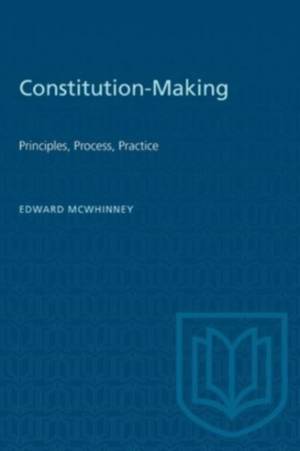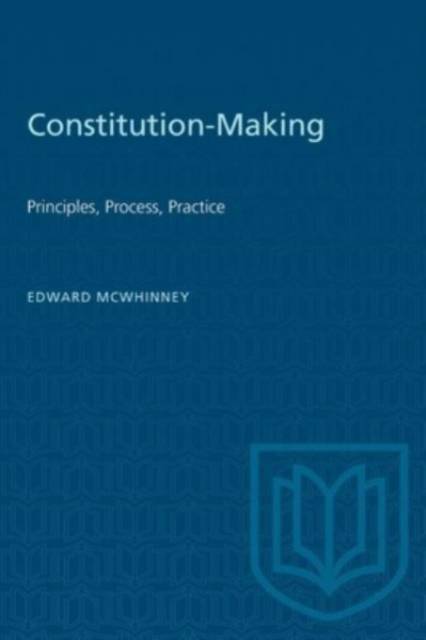
Bedankt voor het vertrouwen het afgelopen jaar! Om jou te bedanken bieden we GRATIS verzending (in België) aan op alles gedurende de hele maand januari.
- Afhalen na 1 uur in een winkel met voorraad
- In januari gratis thuislevering in België
- Ruim aanbod met 7 miljoen producten
Bedankt voor het vertrouwen het afgelopen jaar! Om jou te bedanken bieden we GRATIS verzending (in België) aan op alles gedurende de hele maand januari.
- Afhalen na 1 uur in een winkel met voorraad
- In januari gratis thuislevering in België
- Ruim aanbod met 7 miljoen producten
Zoeken
€ 57,95
+ 115 punten
Omschrijving
In response to the general crisis in law and society in contemporary western and communist nations alike, and to the need for new relations between man and the state, Professor McWhinney presents a comparative study of constitutions and constitution-making.
This book begins with a discussion of constitutional government in western societies - the United States, France, Germany, and Great Britain - the challenges it faces, its philosophy, and its practice. It then draws comparisons to major non-western societies such as Japan and India and to the major powers of the communist world - the Soviet Union and China.
McWhinney discusses in detail the essential aspects of constitution-making - when, why, and by whom it is done, as well as the art of drafting a constitution. He presents the various options: presidential executive or government by assembly, centralization or decentralization, the rule of law and emergency powers, the open society and affirmative action, and direct and indirect elections. All are examined against an empirical record of the experience of major countries.
In conclusion, McWhinney enquires into the claimed socio-economic limits to contemporary constitutionalism, its alleged western ethnocentricity, and the effective political limits to constitutional government today. He offers canons of prudence for contemporary constitution-making.
This book begins with a discussion of constitutional government in western societies - the United States, France, Germany, and Great Britain - the challenges it faces, its philosophy, and its practice. It then draws comparisons to major non-western societies such as Japan and India and to the major powers of the communist world - the Soviet Union and China.
McWhinney discusses in detail the essential aspects of constitution-making - when, why, and by whom it is done, as well as the art of drafting a constitution. He presents the various options: presidential executive or government by assembly, centralization or decentralization, the rule of law and emergency powers, the open society and affirmative action, and direct and indirect elections. All are examined against an empirical record of the experience of major countries.
In conclusion, McWhinney enquires into the claimed socio-economic limits to contemporary constitutionalism, its alleged western ethnocentricity, and the effective political limits to constitutional government today. He offers canons of prudence for contemporary constitution-making.
Specificaties
Betrokkenen
- Auteur(s):
- Uitgeverij:
Inhoud
- Aantal bladzijden:
- 248
- Taal:
- Engels
- Reeks:
Eigenschappen
- Productcode (EAN):
- 9781487579029
- Verschijningsdatum:
- 15/12/1981
- Uitvoering:
- Paperback
- Formaat:
- Trade paperback (VS)
- Afmetingen:
- 156 mm x 234 mm
- Gewicht:
- 349 g

Alleen bij Standaard Boekhandel
+ 115 punten op je klantenkaart van Standaard Boekhandel
Beoordelingen
We publiceren alleen reviews die voldoen aan de voorwaarden voor reviews. Bekijk onze voorwaarden voor reviews.









